- Advice
- Camping Tips
- Disabled People
Expert Guide to Camping and Caravanning for People With Disabilities
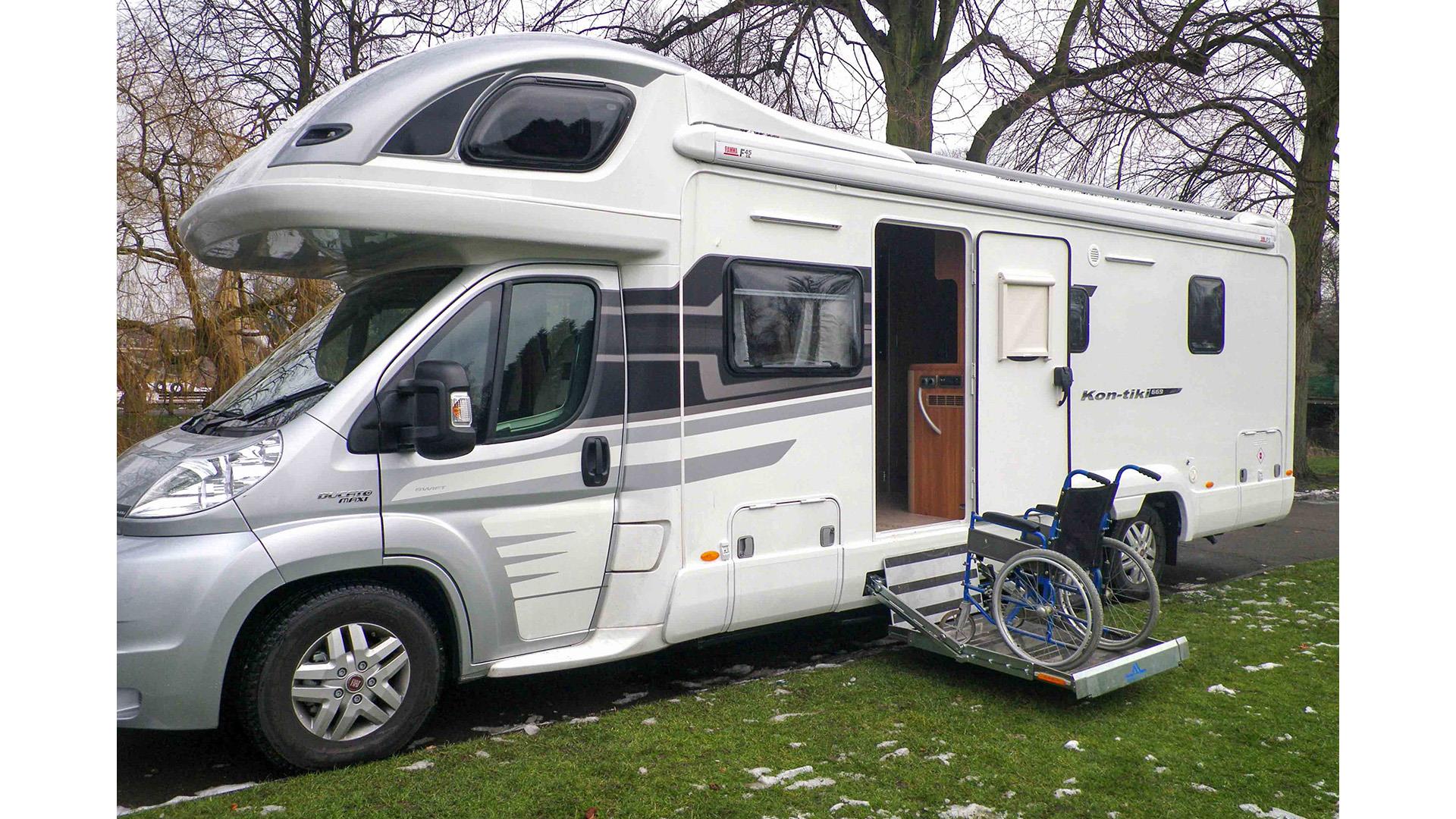
There are 14.6 million people with disabilities in the UK, including 9% of children and 42% of adults of pension age, according to a recent Family Resources Survey, carried out by the Office of National Statistics.
Impairments can’t always be seen and aren’t always physical. People are defined as disabled under the Equality Act 2010 if they have a physical or mental impairment that has a substantial and long-term negative effect on their ability to carry out normal daily activities.
But in reality, disabilities are created by barriers, such as inaccessible buildings or facilities that can't accommodate, for example, people who use wheelchairs.
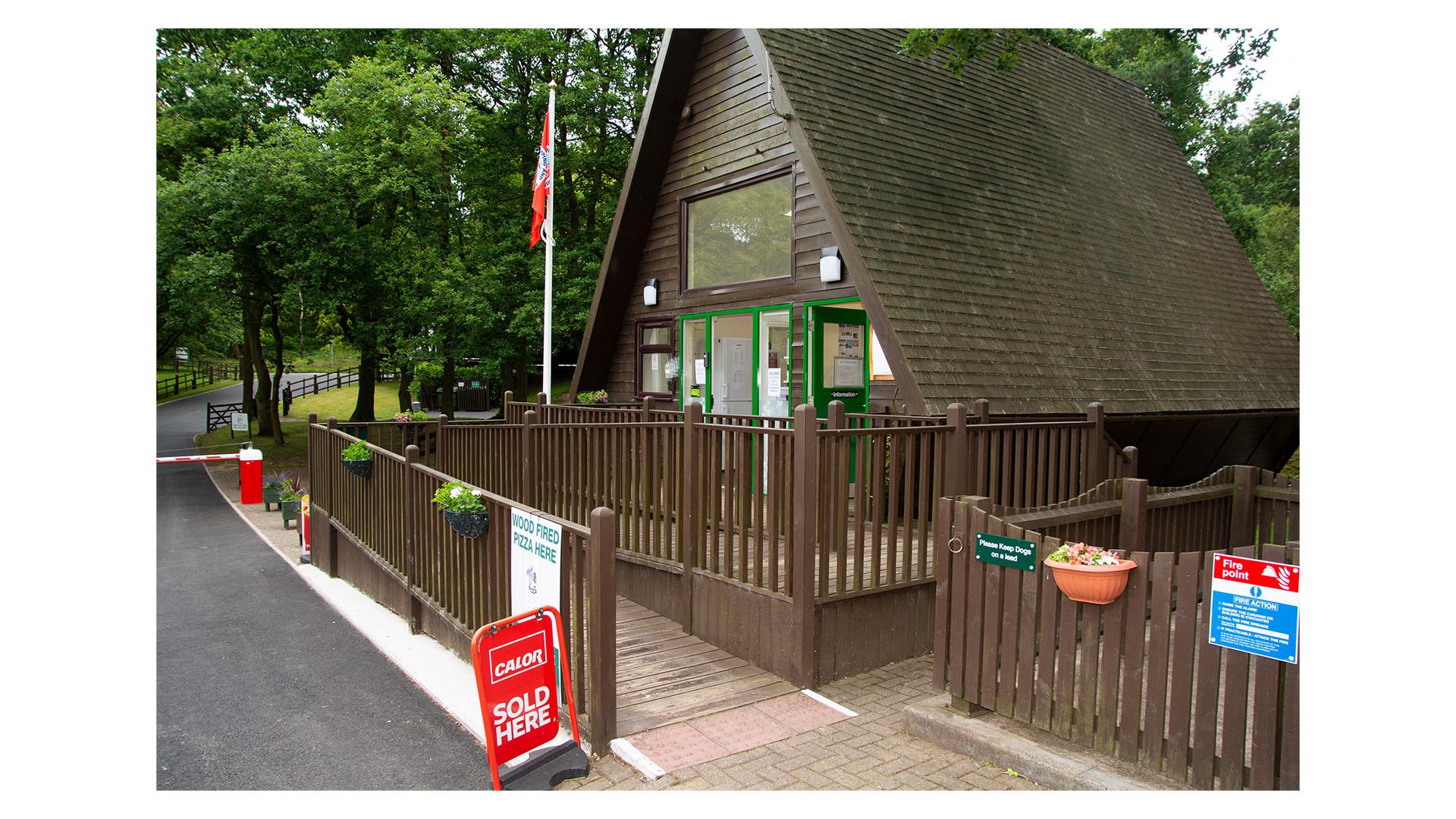 An accessible Club reception with sloping paths
An accessible Club reception with sloping paths
Camping, caravanning and motorhoming can be the ideal way to enjoy leisure time in the great outdoors for people with disabilities with varying physical and non-physical impairments. It allows them to maintain a level of independence similar to that enjoyed at home, which might be more difficult in other holiday accommodation.
Indeed, many camping units can be modified to suit individual requirements, while many campsites and camping facilities are adapted for wheelchair users and people with other mobility impairments, providing accessible shower and toilet facilities with appropriate access and level pathways.
With this in mind, this guide is compiled with the approach that it’s not what a person with disabilities can’t do that is most significant, but what they can do, both with and without the use of aids.
When planning a camping holiday, accessibility and mobility are key factors for people with disabilities. The Club considers such issues carefully when developing and upgrading campsites. For every Camping and Caravanning Club Site there is an access statement, which you can find on each Club Site’s web page, underneath the Site’s contact details.
The access statement includes information that is useful for people with disabilities, such as details of any designated accessible facilities and whether level pitches and hardstandings are close to facility blocks.
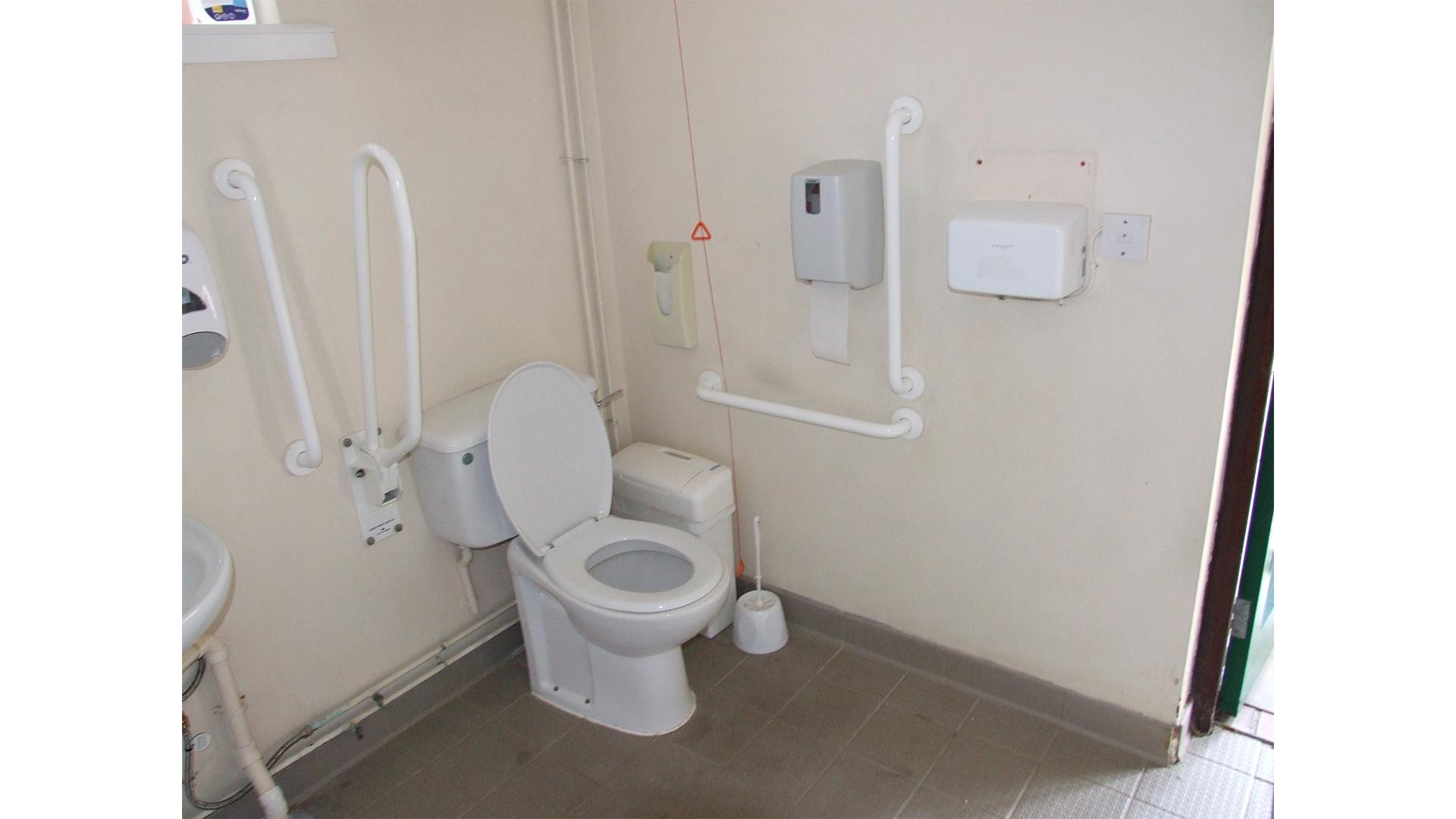 Campsites often offer facilities which have been adapted for wheelchair users and people with other mobility impairments
Campsites often offer facilities which have been adapted for wheelchair users and people with other mobility impairments
However, it is difficult for campsite operators to develop their site to accommodate all impairments and so remove all barriers that can cause people to experience disabilities.
Forethought and sometimes practical experience are therefore helpful when people with disabilities are planning to enjoy camping breaks. The Club’s SiteSeeker – which is available as a printed directory, an online campsite search facility and also as an app – is designed to help filter individual campsite facilities to suit the needs of individuals. Each person has their own expectations and needs, with no single solution matching all requirements. In this guide we’ve rounded up some of the things you may like to consider.
There are specialist adaptation organisations and appliance providers that can offer advice, modification services and products relevant to camping with specific impairments, which we cover later on.
This guide focuses on mobility issues as it is one of the ways camping units and campsites can help make life easier for the camper.
Before you start, it is worth preparing a detailed list of your personal expectations, needs and wishes for an enjoyable camping experience. Your personal preferences and budget will also help narrow down the right product or modification for you. This can be helpful in working through the camping options and identifying those that best suit your circumstances. We will cover all the main forms of camping and caravanning units, from low-cost tents to premium motorhomes.
Three key areas to keep in mind for campers with disabilities considering buying a camping unit are:
- Accessibility Getting into and out of a vehicle and into or out of the living quarters of the camping unit should be foremost in mind
- Driving If adaptations to facilitate driving are necessary, keep this in mind from the outset
- Living All camping units come with their own specific requirements for pitching and striking camp, so bear in mind aid and adaptations that may be required to help with these and other everyday tasks on a campsite.
Choosing a folding camper, trailer tent or tent
When it comes to selecting the right camping unit for you, many of the same principles apply for campers with or without disabilities, but there are some areas of particular importance if your impairment means camping may be challenging.
The Club highly recommends you try pitching a camping unit before buying it. This is a practical option at many of the regional camping shows in the UK. Even at national indoor shows such as the Caravan, Camping and Motorhome Show at Birmingham’s NEC each February, you should be able to handle tents and trailer tents to identify what could work and what will not work for you. The stand staff will be accommodating, especially when the show is quieter, such as at the start or end of each day.
Once you have your kit make sure you have a few dry runs at putting it up and down in the garden or at a local campsite before you head out camping for real. This way you can develop techniques to make pitching easier.
There are folding campers that do not need pegging out and that have assisted opening by means of gas struts such as the Pennine Outdoor Leisure Pathfinder. While trailer tents do require pegging out, it’s possible to buy special screw-in pegs and a cordless drill, which makes the task less physically challenging.
Trailer tents offer wide doors, spacious interiors and built-in beds at heights that many people with disabilities may find easy to transfer from and to.
Larger tents have many different ways of being supported and inflatable or knuckle-jointed pole systems may be a good option for some. Depending on the design and size, they can provide a good volume of accessible accommodation but often require two or more people to pitch them safely and successfully. For many campers, this represents a good opportunity for younger family members to get involved and be responsible for some tasks. Do consider how to pack away after a stay, some inflatables may be deflated more easily with the aid of an electric pump that can suck the air out. Look out for tents with wider doors, for easy access, and groundsheets that can lie flat in doorways to avoid tripping hazards and allow easy access if required. Foam or plastic floor tiles are also a good idea – they lock together and are more solid, so will stop wheels from getting stuck in soft ground. Tent and trailer tent campers can make use of electricity with a mobile hook-up unit. For more information click here.
Caravanning
If your vehicle is already adapted for use with impairments, it may be suitable as a tow car. So towing and using a caravan may be a good way to enjoy camping for people with disabilities. If you do not feel confident about towing, the Club runs towing courses at its Headquarters in Coventry and towing taster sessions at many of the larger camping and caravanning shows.
Unfortunately, some adaptations prevent a tow bar being fitted to some tow cars. If in doubt, confirm this with the adaptation provider or tow bar installer.
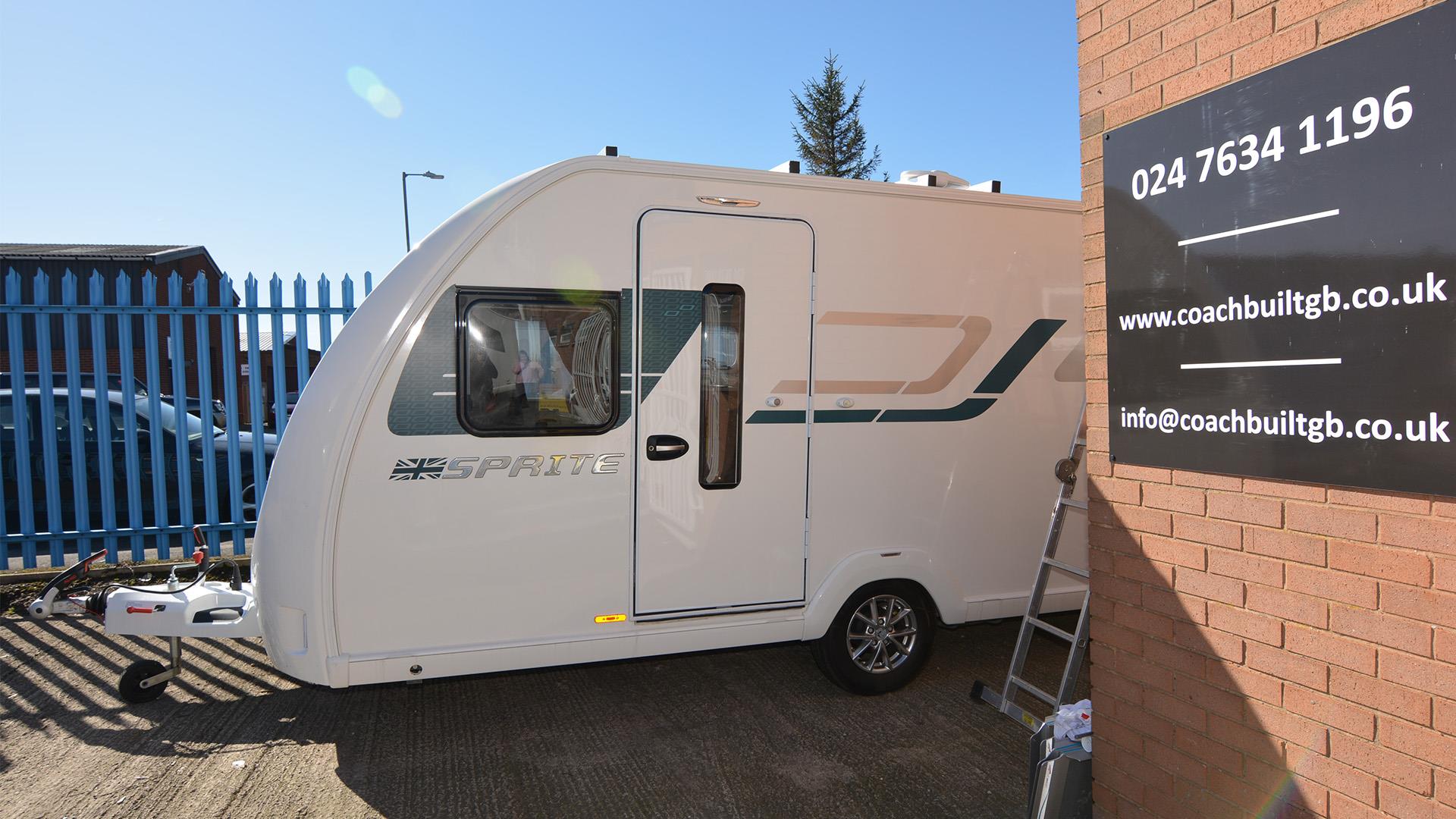 This modified caravan has had the door widened to accommodate easier access
This modified caravan has had the door widened to accommodate easier access
There are also reputable and established specialist suppliers that can assess, advise and adapt caravans to your individual needs, including access and interior layouts and features. See our list of possible mobility adaptations at the end of this guide.
A motor mover can be helpful for positioning your caravan on a pitch or driveway at home. Caravan steadies can be lowered and raised using a cordless drill, or fully automated levelling systems can be installed. A solution for some campers with disabilities collecting and transporting water is to hook an Aquaroll or Wastemaster to the back of a mobility scooter or wheelchair. Campsite bollards and unit hook-up inlet points for the electricity are also positioned at a low level with few fiddly catches to negotiate.
Depending upon individual circumstances, a similar level of independence to that enjoyed from adapted mobility vehicles can often be replicated in the caravan itself. You do not need to buy a new caravan as many companies will adapt a pre-owned one if you prefer, depending on the interior layout.
Many of the important things to consider when campers with disabilities research buying a caravan are the same as for any other caravanner.
First, the caravan and tow car need to be suitably matched on weight and the car have enough power for safe towing. The Club has a comprehensive Towing Match Service to compare vehicles and caravans and matching advice.
Any specific questions can also be directed to the technical team, you’ll find contact details at the bottom of this page.
You will also need to ensure your driving licence permits you to tow your particular combination of car and caravan and have confirmation from your insurer that you will be covered for towing.
Any modifications you make, or have made, to the caravan may add weight and therefore reduce the available user payload. That is, the amount of food, kit and personal items you can carry in the caravan. The caravan’s stated weight may be upgraded, as long as this is within your driving licence and tow vehicle limits and the chassis manufacturer’s limits. Talk to your adaptation specialist about your options.
Caravanning with special adaptations
Popular caravan adaptations include having doorways widened and having a ramp or electric hoist fitted. Caravans can also be modified to include, for example, the installation of an accessible wet room. See our list of possible modifications at the end of this guide.
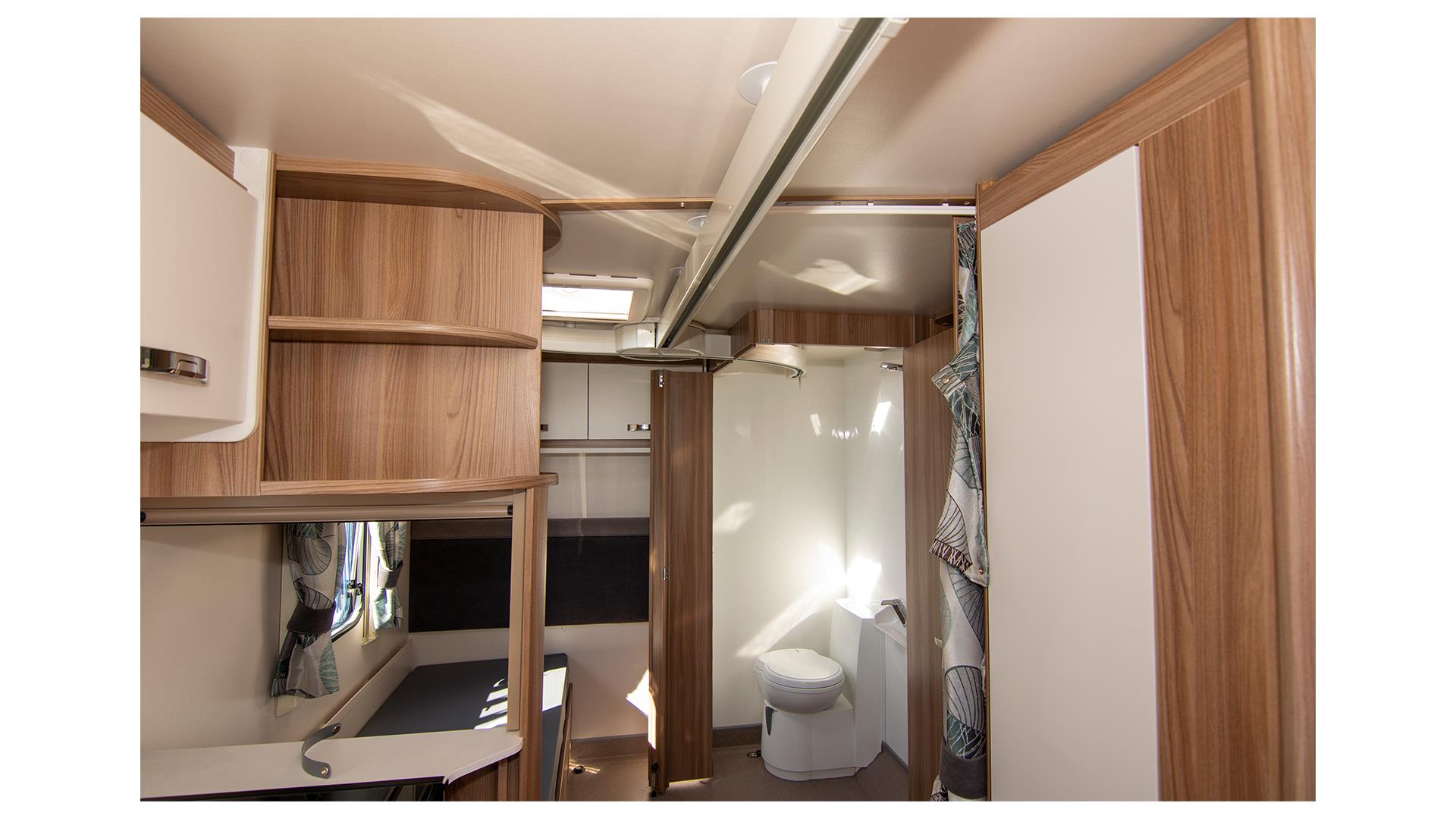
If you plan to make significant modifications to the structure of the caravan discuss this with your chosen adaptation specialist, try to identify what is achievable in advance and include these in your budget.
You may need access to mains electricity – via an onsite electric hook-up – while camping, for some vital equipment such as electric wheelchair batteries or breathing aids. Check a hook-up will be available when booking and consider how you would cope if it failed. For example, would you need additional leisure batteries or a reliable generator? Many campsites forbid the use of certain types of generators for reasons of noise pollution but may allow them in the case of medical need, so do check before booking.
Finally, be considerate to other campers if generators are used as even quiet ones are noisy at night. If you are camping without hook-up, consider whether another means of charging your leisure battery might be helpful, such as a solar panel.
Awning tips
An awning can be useful to provide additional storage for mobility aids. Pitching an awning can be a challenge for even the fittest camper without disabilities, so assistance may be needed with this. Inflatable-tube awnings are proving popular, though most still need to be threaded through the awning rail around the side of the caravan, which can be difficult for campers with disabilities with limited mobility, although using products such as an awning pulley system (see below) may make attaching awnings a bit easier for one person.
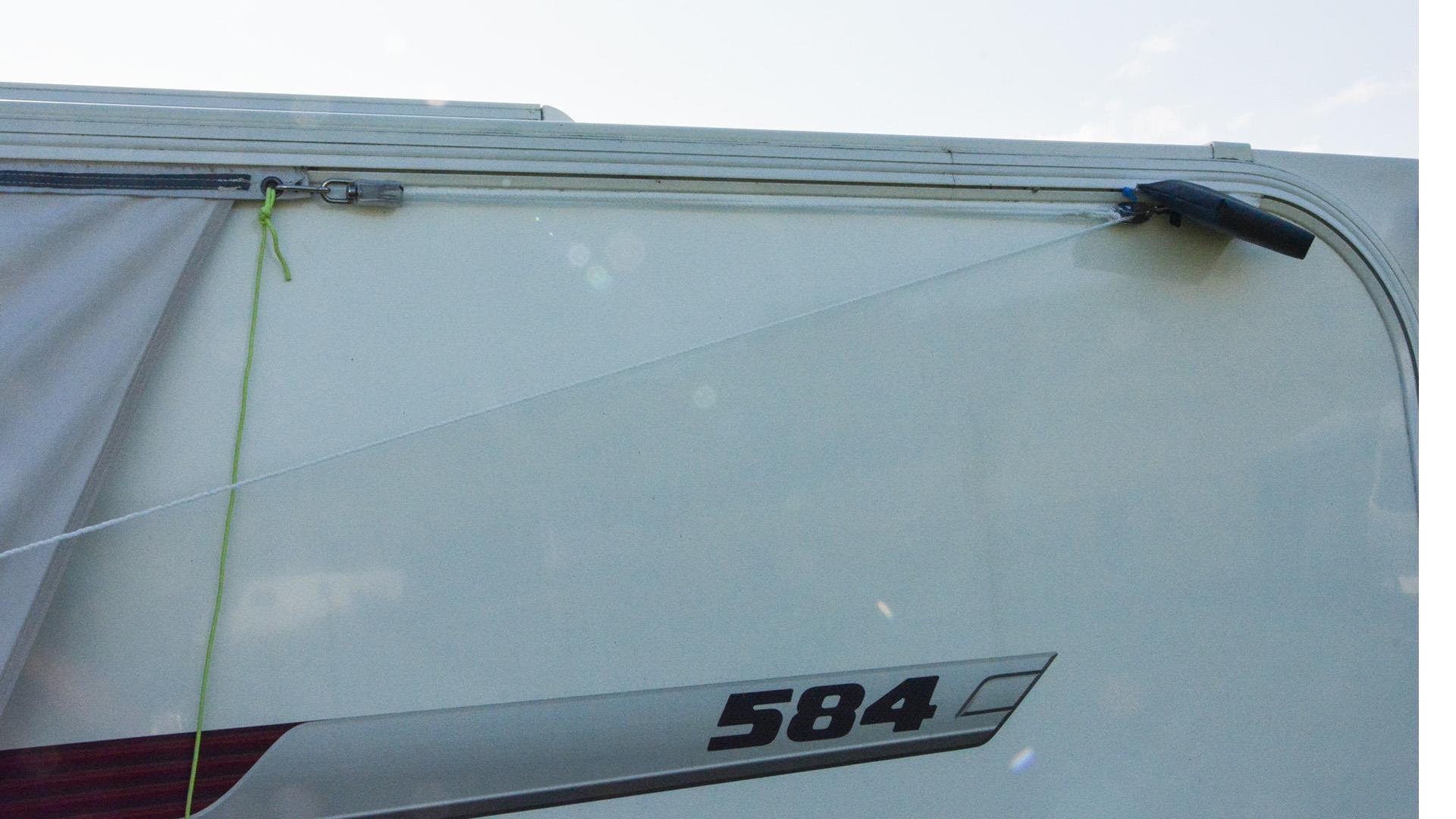
Some assistance from campers without disabilities or Holiday Site Team members may be necessary for some activities, such as hitching and un-hitching the caravan from the tow car. Be sure to check directly with the team first to ensure they have the capacity to assist with such requests.
Motorhoming
A motorhome, whether it is large or small, can provide great holiday accommodation for campers with disabilities.
The variety of motorhomes on the market is greater than the types of caravan so there are more options available. It may be possible to find something that will suit your needs without extensive modification. Most motorhomes are available with an automatic gearbox option so this should be considered early on in the buying process. Used motorhomes do represent good value, but do consider the VAT relief implications (covered later) and how sound the vehicle is, especially when extensive modifications are needed.
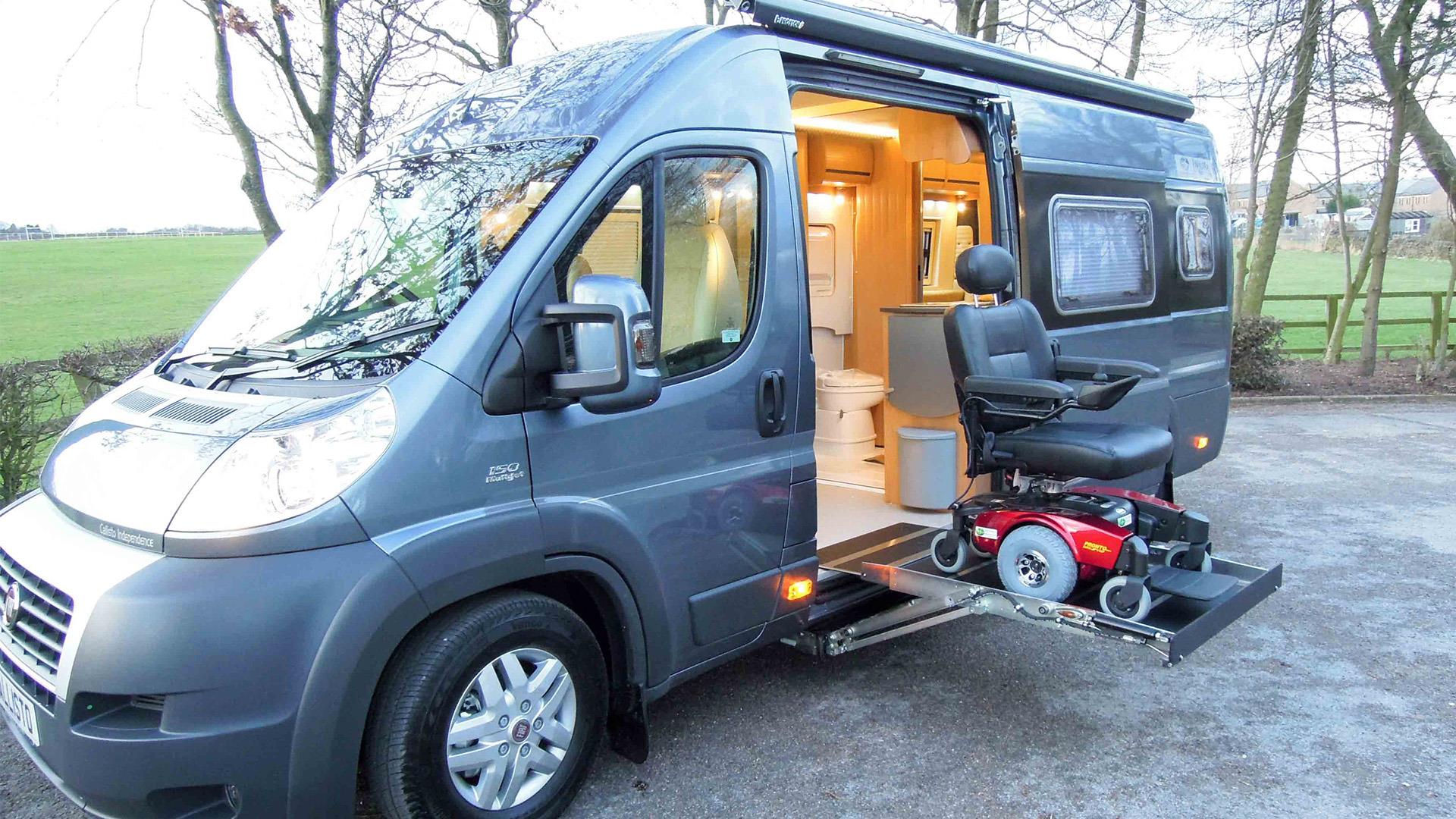
Many motorhomes can accommodate an additional leisure battery, which can enable extended stays without an electric hook-up and provides a source of emergency electric power if you rely on certain equipment. Alternatively roof-mounted solar panels can top-up your battery throughout your stay.
Adapting a motorhome
Extensive adaptation to accommodate mobility aid use and storage can be quite costly. Also any weight fixed to the motorhome chassis or body work reduces the user payload by an equal amount. Travel modifications to suit the driver are another factor to take account of, such as control adaptation and vehicle access. A larger motorhome is often the only choice for extensive adaptation so you will need to check whether your driving licence categories will allow you to drive it.
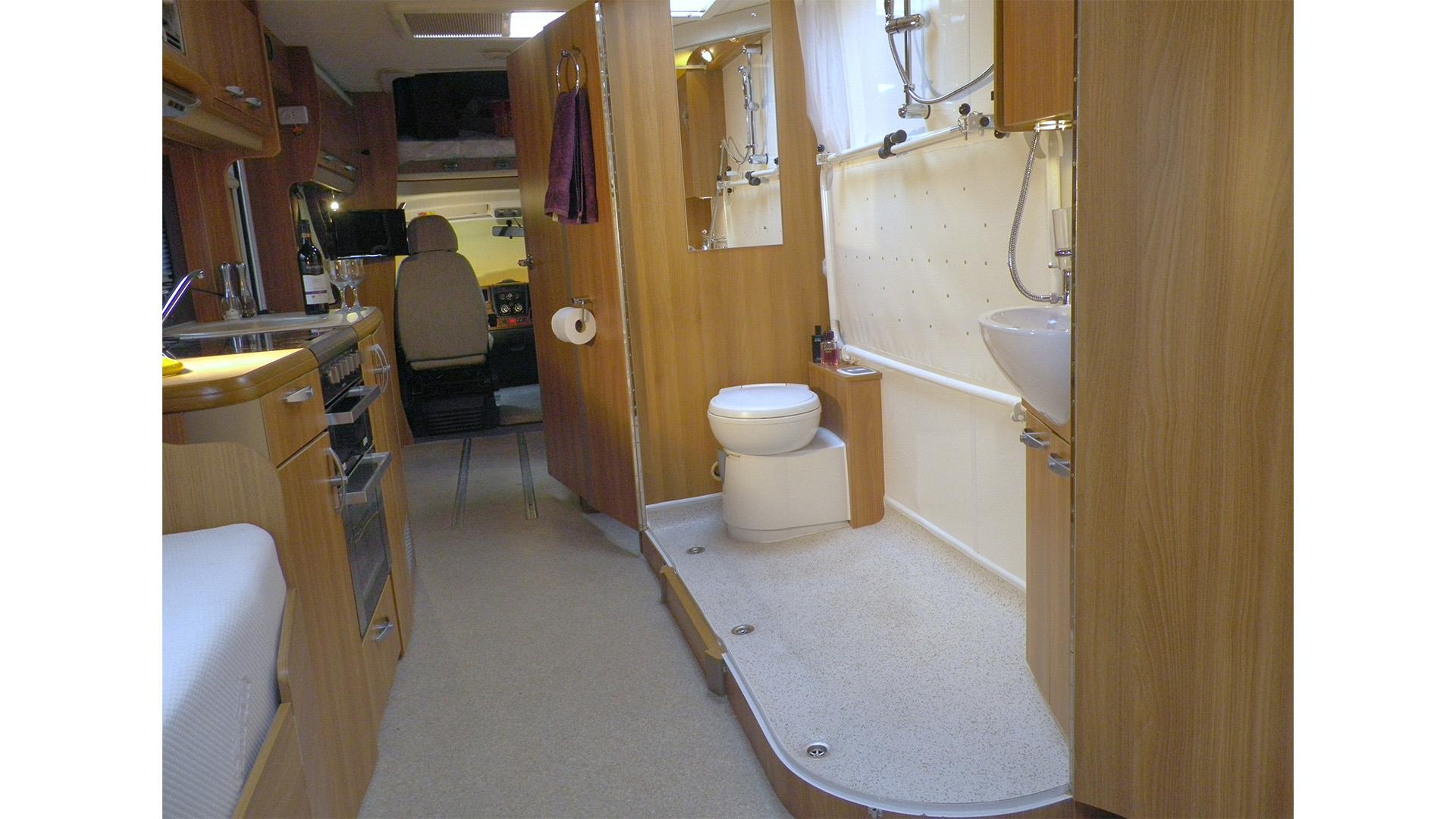 Take time to consider exactly what adaptations you require to suit your needs while camping
Take time to consider exactly what adaptations you require to suit your needs while camping
Again, it is worth preparing a list of your essential and desirable requirements before visiting some adaptation specialists or suppliers. Consider all those using the vehicle and remember there is no such thing as a standard modification. See our list at the end of this guide for possible adaptation modifications and ideas.
High-top panel van conversions in particular are popular, such as the Fiat Ducato LWB/XLWB, which already has three full-height doors and two extra-wide entrance apertures. This means there is no need for any further modification to facilitate suitable access, plus adapting it for driving is simpler to achieve. Open lounge layouts are ideal for such purposes, and in addition, mobility scooters can be transported inside if required.
There is also a growing band of small motorhome converters who will design and build from scratch on both new and pre-owned vehicles, and many campers with disabilities go down this route.
Finally, pre-owned examples of adapted motorcaravans do appear pretty often in the regular classified advertising channels for motorhomes and other camping units.
VAT relief
In April 2017 HMRC clarified VAT relief on motorhomes adapted for campers with disabilities. It confirmed that VAT relief on the basic motorhome is only available for wheelchair or stretcher users. If you believe you can take advantage of this tax relief you should check with your supplier before placing any order.
If, however, you have a disability and require modifications to the motorhome because of your disability then these adaptations can be zero-rated for VAT under certain conditions, even if you have had to pay VAT on the motorhome purchase itself. Further information is on the government website here.
Motorhome or caravan?
Motorhomes can have advantages over caravans. Fresh water and grey water can be carried on board, provided you have enough payload allowance. Setting up on site can be more straightforward and requires less mobility than for a caravan. En-route stops can also be easier with no need to transfer between vehicles.
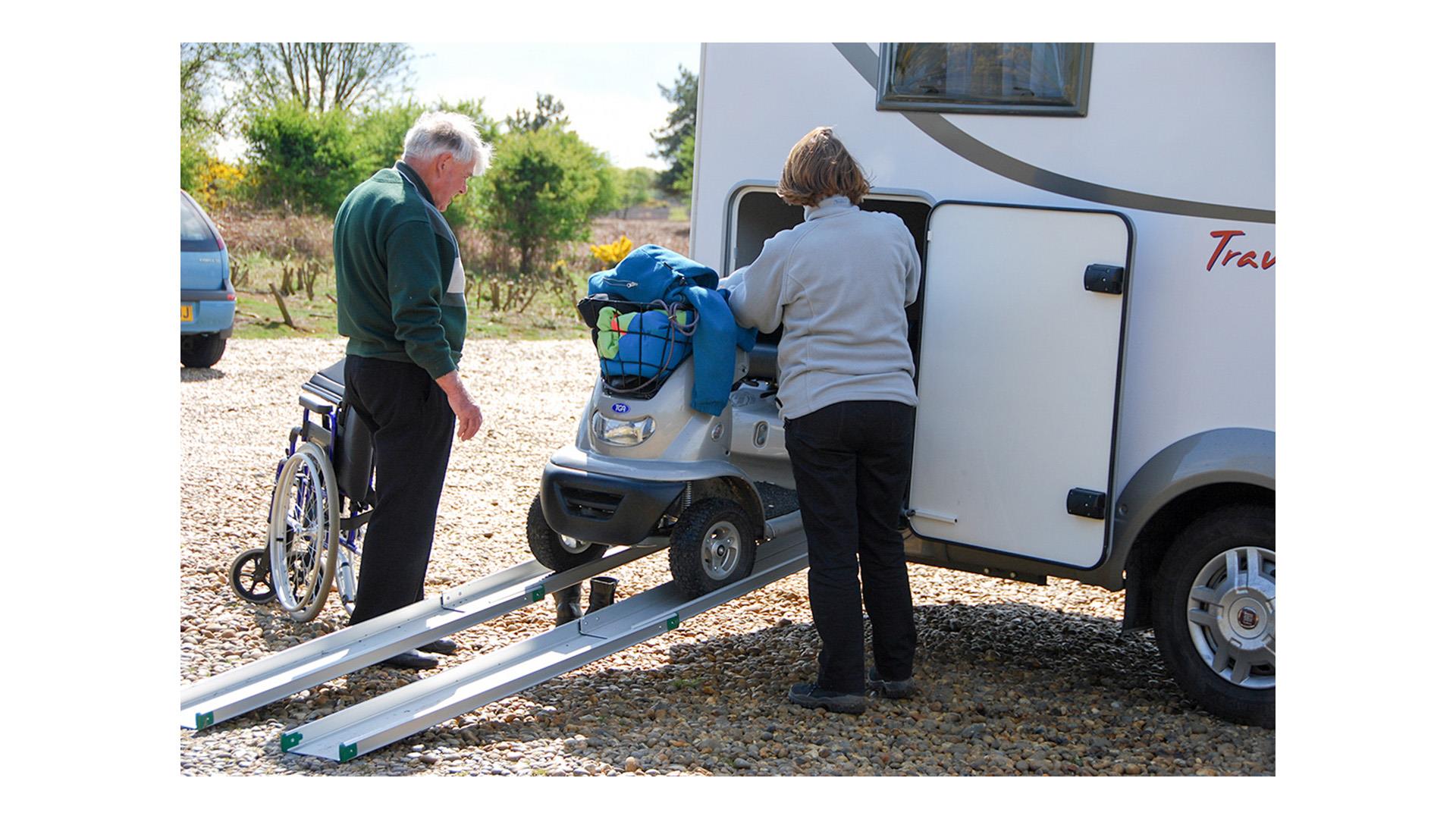 A rear garage area can be handy for storing mobility aids in a motorhome
A rear garage area can be handy for storing mobility aids in a motorhome
On the other hand, once you have pitched a caravan on site you can leave it there for the rest of your trip. Your vehicle is then available for travelling around. If you have a motorhome, you will need to pack everything away if it is your only transport during your holiday. You will also need to make sure any towns, cities and car parks you are planning to use can accommodate such a large vehicle, which is unlikely to go under height barriers or fit in a standard car parking space.
Also, think about future-proofing your purchase: that is, consider and assess any likely changes in health that any condition or impairment may bring in future. And have you thought that one day you may wish to take grandchildren on a camping break with you, for example?
Whichever vehicle you choose, you should also think about where it will be kept when you are not using it as it is likely to be longer, wider and heavier than a car.
Insurers often require specific trackers and alarms to be fitted and used on expensive vehicles such as motorhomes or large caravans.
Possible mobility adaptations and modifications
 Motorsteps supply self-powered portable steps to aid access to caravans and motorhomes
Motorsteps supply self-powered portable steps to aid access to caravans and motorhomes
Here are some items you may like to think about when looking for and adapting a caravan or a motorhome:
- Increasing the size of the access door
- Adding a step or ramp to ease access
- Space to enable wheelchair access throughout interior
- Installing grab handles internally and externally
- Internal transfer to and from seating/bed/shower
- Secure storage for a wheelchair or electric scooter if not in tow vehicle
- Toilet height and access and ease of use
- Shower usability
- Table and worktop height and access to seating
- Bed height and arrangement
- Access to light switches, control panels, roof vents and similar
- Cupboard and storage accessibility
- A popular accessory is the Motorstep, which is a platform you stand on that electrically raises you to the height of your leisure vehicle's door
Motorhome specific modifications
- Manual or automatic transmission
- Disabled driver access
- Control adaptations
- Secure travel position for wheelchair and user
- Secure storage for an electric scooter or wheelchair and other mobility aids
- Consider adding a lift to ease access

Other items to consider
- Whether there will still be sufficient user payload after modification – this may be upgraded
- Appropriate driving licence to allow it to be towed/driven
- Parking and storage
- Security devices – mechanical and electronic
- The overall purchase price with adaptation costs
- The overall running costs
Adaptation specialists for caravans and motorhomes:
Coachbuilt GB
Tel 02476 341196
Motorstep
01296 709630
Accessories:
Avonstar Classics
Tel 0121 643 0408
Caravan levelling systems
E & P Hydraulics
01254 297 785
BraunAbility
Tel 01935 827 740
Mobile step platforms
Motorstep
01296 709630
info@motorstep.net
